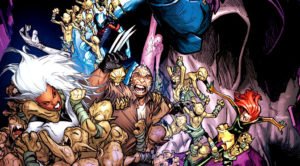“Fallen: Self Made Man”
Brisket Gaming LLP, 2016
Writer: Ryan Garcia
Writing in 1883, German philosopher and writer Friedrich Nietzsche in his book “Thus Spake Zarathustra”, and in 1886 in his book “Beyond Good and Evil”, proposed that any being may fulfil their ultimate potential and that all it took was “will to power”. This fundamental drive is, in Nietzschean theory, stronger than the will to live. The “will to power” is considered by some scholars to mean a struggle against one’s surroundings that culminates in personal growth, self-overcoming, and self-perfection.
English writer George Bernard Shaw took up this concept in the very long epilogue to his play “Man and Superman” (1903), theorising, in a mystic variation on Nietzsche’s theme, that there was an internal will operating independently of intellect, which Shaw called the “Life Force”. (Arthur Schopenhauer (1788-1860), the famous German philosopher whose best-known work is “The World as Will and Idea” (1909), called “the Force” – no doubt giving rise to “the Force”, an unseen energy field, used extensively in the “Star Wars” movies).
Writing in 2016, Austin, Texas-based writer Ryan Garcia appears to have taken some of these Nietzschean elements and incorporated them into his self-published comic book, “Fallen”. On the face of it, this story is concerned with a 1990s-style “grim ’n’ gritty” superhero facing the “Adolf Hitler’s grandparents” ethical dilemma: if time travel is possible, would you go back in time to kill the innocent to prevent the ultimate evil? In the context of superhero comics, this is perhaps best reformulated as a problem relating to DC Comics’ premier superhero property Batman, who was inspired to fight crime by the pointless murder of his parents by a common criminal. Would Batman travel back in time to save his parents – but in doing so, doom those many thousands of people who had saved as Batman?
Scratch away at the surface, and look to the title – “Fallen: Self-Made Man” – and there is a more subtle message. The (apparently fictional) fighting technique which the title character Fallen uses is called “The Perfect Art”. It involves incapacitating yourself to better incapacitate your opponent, and then ignoring the pain while cataloguing the injuries and moving on. This is undeniably a very Nietzschean expression of “will to power”. The injuries that Fallen describes in the monologue written by Mr Garcia are guaranteed to evoke a wince or two. Yet Fallen drives on, broken bones and torn ligaments no barrier to his will.
Fallen’s fight against evil is triggered by the murder of his father. This is a nod to the Batman mythos, and indeed the inner monologue we mentioned above, and a hatred of guns over which the character muses, is a homage to Frank Miller’s technigue in “The Dark Knight Returns” (1986). Gunned down by an anonymous criminal, Fallen’s father is a good man who plainly loves, and is loved by, his son. Beside himself with grief, the young boy visits the site of the murder, and is taken in by a stranger who trains him in the Perfect Act. Fallen goes onto be a scourge of the underworld, his relentlessness only given pause by the arch-criminal known as “Fanatic”.
In their final encounter, Fanatic has procured a time machine. In a rapid sequences of panels, the villain uses this device to drag Fallen back to the trigger point: the scene of the murder of Fallen’s father. There is a very poignant, well-drafted scene where the adult Fallen spies the toy he lost immediately before his father’s death, looping and tying together the emotional crescendo to the heart-breaking beginning. Fanatic hands Fallen the gun which killed Fallen’s father, and Fallen realises that there is no third party murderer at hand. Caught in the hideous dilemma of weighing up the value of his beloved father against the many lives Fallen has saved since his father’s death, the hero makes a dreadful decision. Fallen uses the gun to anonymously kill his own father.
Fallen thereby ensures that his younger self is made miserable and broken, and thus motivated to undergo the brutal training that will lead to the many heroic acts of his future. To ensure that the young boy gets there, in a loop of continuity, Fallen also takes on the anonymous role of the boy’s trainer as the mysterious stranger in the circus park. Fallen has become a murderer and deceiver. The title character is true to his name: he is both self-made, and fallen.
“Eternal recurrence of the same,” as Nietzsche wrote in “Thus Spake Zarathustra”. Taken literally as a theory for how things are, Nietzsche appears to imagine a physical universe of perpetual struggle and force that repeatedly completes its cycle and returns to the beginning. Fallen is not just a self-made man, at the end. He is an agent for both self-creation and self-destruction.
Under a thin veneer of grey superheroics lies an even blacker message which is both profound and ethically challenging.
“Fallen” is available as an e-book on Amazon.

